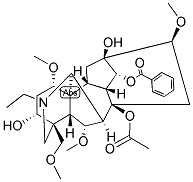8-ACETYL LUDACONITINE
8-ACETYL LUDACONITINE
- CAS No.127-29-7
- Chemical Name:8-ACETYL LUDACONITINE
- CBNumber:CB9311666
- Molecular Formula:C36H51NO12
- Formula Weight:689.79
- MOL File:127-29-7.mol
8-ACETYL LUDACONITINE Property
- Melting point 214°
- alpha D20 +17° (alc)
- Boiling point 697.88°C (rough estimate)
- Density 1.2083 (rough estimate)
- refractive index 1.6630 (estimate)
- pka 12?+-.0.70(Predicted)
- FDA UNII 5483BY72RT
- Symbol(GHS)
- Signal word
- Hazard statements
- Precautionary statements
8-ACETYL LUDACONITINE Chemical Properties,Usage,Production
-
Description
An aconitine alkaloid obtained from A coniturn chasrnanthurn Stapf. by Dunstan
and Andrews, the base crystallizes from EtOH as hexagonal prisms or rosettes of
fine needles. It has [α]20Do + IS.3° (EtOH) and gives a series of crystalline salts,
e.g. the hydrobromide as hexagonal prisms from H20, m.p. lS3-7°C; [edo -
17.3° or as crystals from EtOH or Et 20, m.p. 217 -SoC and the aurichloride,
yellow needles, m.p. 147 -152°C with sintering at 142°C. Indaconitine resembles
Aconitine (q. v.) in giving a crystalline precipitate with KMn04 but in this case
the crystals are markedly smaller. Four methoxyl groups are present and when
the SUlphate is heated in aqueous solution in a sealed tube it furnishes acetic acid
and benzoylpseudaconine (Indbenzaconine), as a colourless glass, m.p. 130-3°C;
[α]D + 33.6° (EtOH), also giving crystalline salts: hydrochloride, m.p. 242-4°C;
[α]D - S.Oo (H 20); hydrobromide as the dihydrate, m.p. 247°C (dry) and the
aurichloride, rosettes of orange needles, m.p. 180-2°C.
Alkaline hydrolysis gives acetic and benzoic acids and pseudaconine, C2sH4108N. On pyrolysis, the alkaloid loses one mole of acetic acid with the formation of a-pyroindaconitine which is amorphous, m.p. 130-2°C; [α]D + 91.9° (EtOH), giving a crystalline hydro bromide, m.p. 194-SoC. When inda_x0002_conitine hydrochloride is subjected to the same treatment it yields the isomeric ~-pyroindaconitine, also amorphous, but furnishing a crystalline hydrobromide, m.p. 24S-250°C; [α]D + 27.6°. - Chemical Properties White crystalline, amorphous, or syrupy sub stance; salts are optically active; melts at214°C (417.2°F); insoluble in water, solublein alcohol, ether, and chloroform.
- Uses 8-Acetyl ludaconitine occurs in the tubers of Indianaconite (bish or Aconitum ferox), found inIndia and Nepal. It is used in arrow poisoningfor hunting. Clinically, it is used in treatingrheumatism.
- Health Hazard Feraconitine is a highly toxic alkaloid. Theacute toxic effects are similar to those ofaconitine. The symptoms from ingestionare drowsiness, nervous disorders, weakness,.
- References Dunstan, Andrews, J. Chern. Soc., 87, 1620 (1905) See also: Bauer, Radjhan., Pharrn. Zent., 72,145 (1931)
8-ACETYL LUDACONITINE Preparation Products And Raw materials
Raw materials
Preparation Products
Global(9)Suppliers
- Supplier: United States Biological
- Tel:--
- Email:chemicals@usbio.net
- Country:United States
- ProdList:6214
- Advantage:80
- Supplier: Shanghai Jingke Chemical Technology Co., Ltd.
- Tel:--
- Email:jingkehuaxue@163.com
- Country:CHINA
- ProdList:6972
- Advantage:58
- Supplier: Xiamen Research Biotechnology Co., Ltd.
- Tel:--
- Email:1562893815@qq.com
- Country:CHINA
- ProdList:6936
- Advantage:58
- Supplier: Shanghai Caiyou Industrial Co., Ltd.
- Tel:--
- Email:15821073967@163.com
- Country:CHINA
- ProdList:6893
- Advantage:58
- Supplier: Beijing Fubo Biotechnology Co., Ltd.
- Tel:--
- Email:info@f-biology.com
- Country:CHINA
- ProdList:6025
- Advantage:58
- Supplier: Shanghai Hao Biological Technology Co., Ltd.
- Tel:--
- Email:shxiyuanbio@163.com
- Country:CHINA
- ProdList:6906
- Advantage:58
- Supplier: Wuhan Boot Biotechnology Co., Ltd.
- Tel:--
- Email:
- Country:CHINA
- ProdList:6829
- Advantage:58
- Supplier: Shanghai Yaji Biotechnology Co., Ltd.
- Tel:--
- Email:
- Country:CHINA
- ProdList:6857
- Advantage:58
- Supplier: Apin Chemicals Ltd.
- Tel:--
- Email:info@apinchemicals.com
- Country:United Kingdom
- ProdList:6807
- Advantage:42
- C34H47NO10
- C36H51NO12
- 乙醯基藜蘆基假烏頭原鹼
- 類烏頭鹼
- 假烏頭鹼
- 127-29-7
- Aconitane-3,8,13,14-tetrol, 20-ethyl-1,6,16-trimethoxy-4-(methoxymethyl)-, 8-acetate 14-(3,4-dimethoxybenzoate), (1α,3α,6α,14α,16β)-
- acetylveratrylpseudoaconine
- pseudoaconitine
- (16S)-20-Ethyl-1α,6α,16-trimethoxy-4-methoxymethylaconitane-3α,8,13,14α-tetrol 8-acetate 14-(3,4-dimethoxybenzoate)
- acetyl benzoylpseudo-aconine
- 8-ACETYL LUDACONITINE
- INDACONITINE
